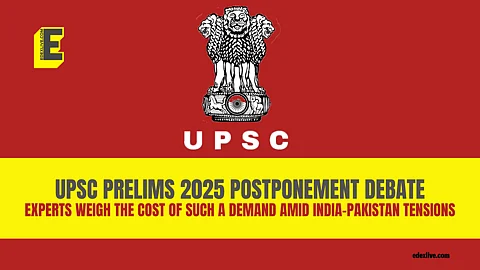
- News
- Campus
- Exam
- Podcast
- Web Stories
- Do You Know
- Path Finders - UG Programs
- Videos
- Élitscape

The Union Public Service Commission (UPSC) Civil Services Preliminary Examination 2025, scheduled for May 25, 2025, has become a focal point of a heated debate, as candidates from border regions demand a postponement due to prevailing tensions between India and Pakistan.
Aspirants from affected regions, including Jammu, Kashmir, Punjab, Rajasthan, and Gujarat, have been facing innumerable hurdles since Operation Sindoor while they were gearing up for the most important bureaucratic exam in the country.
A letter dated May 13, 2025, addressed to Prime Minister Narendra Modi, the Union Home Minister, and the UPSC by former Intelligence Bureau (IB) officer Navjot Singh detailed the dire circumstances faced by these aspirants. He spoke of students who have lost their homes while living in constant fear and uncertainty.
Several educational institutions in border districts have been declared closed, and vehicular movement has been restricted since the operation began. Despite this, the candidates are clamouring that UPSC has released admit cards without addressing the postponement requests, eliciting widespread debate about fairness and equity in the examination process.
Are their demands legitimate?
The situation sparked diverse opinions amongst UPSC experts.
Ketan, an expert from UPSCprep, a UPSC preparatory platform, supported the postponement, arguing that the ongoing tensions create an uneven playing field.
He said, “Even after the understanding reached on May 10, there have been ceasefire violations, resulting in night-long blackouts, internet shutdowns, and an overall fragile peace. In such a situation, it becomes extremely difficult to concentrate on exam preparation.”
Ketan also highlighted the situation of Armed Forces officers who will not be able to appear for the exam due to cancelled leaves, and the struggles of long-distance travel to exam centres, amid government advisories prohibiting non-essential movement.
He further told EdexLive, "The agency responsible for recruiting empathetic civil servants must itself act with empathy," and stressed how postponing the exam for just a few weeks might make the examination more inclusive.
Himanshu Poswal of CSEWhy, another UPSC expert, also acknowledged the legitimacy of the aspirants’ concerns, particularly for those in border regions. He stated, “Homes of a few aspirants residing in border areas, whom I know personally, have been impacted by the strikes, while others are suffering from PTSD (Post-Traumatic Stress Disorder).”
He further added, “The principle of natural justice finds a violation here,” suggesting that the UPSC should have communicated more actively with affected candidates to address their concerns.
In contrast to this, another expert takes a more reserved stance, questioning the need for a postponement despite the uncertainties. They said, on the condition of anonymity, “Though there have been uncertainties regarding the situation prevailing at this moment, I don’t think it warrants the postponement of the exam.”
They expressed that UPSC must have taken the situation into cognisance and therefore decided to go ahead. She also noted that postponements, like the ones during the pandemic, led to a disarray in the schedule, creating further issues.
Can these bureaucratic exams be postponed?
The UPSC exam has been delayed three times in the past five years, twice due to the COVID-19 pandemic and once for general elections.
Ketan argued that these situations show the UPSC’s capability to manage such situations effectively, and stated, “UPSC is fully capable of postponing exams on short notice and still managing them efficiently on a later date.”
Himanshu, however, urged for a balanced perspective, noting that the decision ultimately lies with the commission.
He reflected, “I feel both India and aspirants have moved beyond pandemic behaviour. We need to take an objective look at the reasons that caused the delays. Can exams be postponed? We've seen that happening in practical cases.”
Another expert, on the other hand, cautioned against such frequent postponements, stating, “Postponement of the exam is not uncommon. It has been done in the past, but these have to be in sync with the situations that demand this," noting that such disruptions might disturb the academic calendar, causing more harm than good.
With only 10 days remaining until the scheduled exam date, affected candidates are caught between geopolitical tensions and their career aspirations. Will there be a potential solution to the lingering issue?
